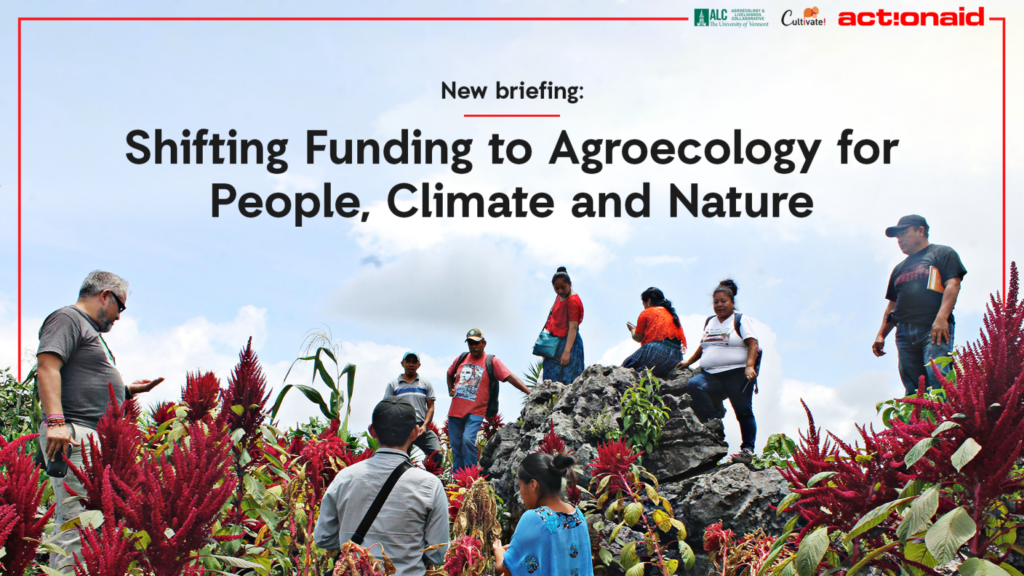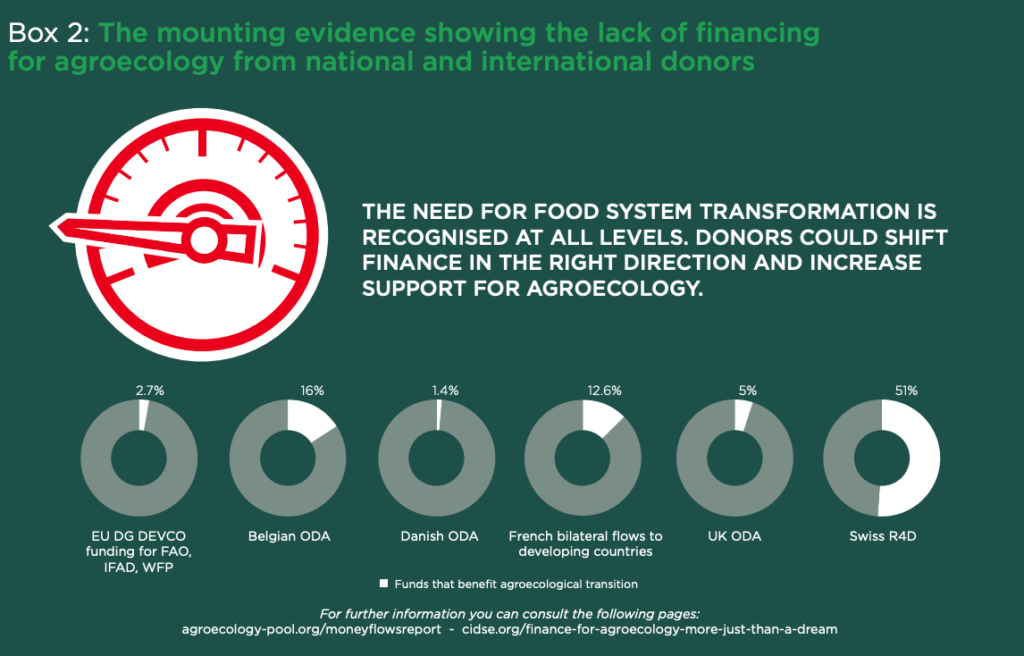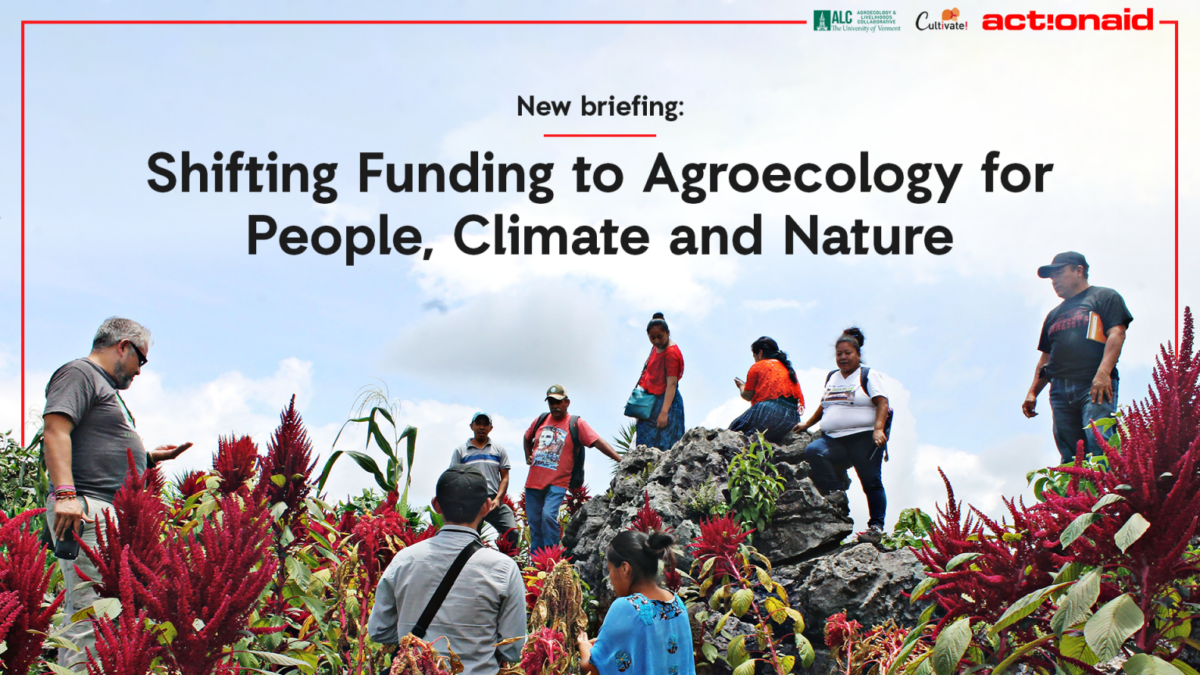
Click here to read the new report:
“Shifting Funding to Agroecology for People, Climate and Nature“
The majority of public and philanthropic funding supports ecologically and socially damaging forms of agriculture and food systems. How can financing be transformed so that it fosters transitions towards more just and sustainable food systems and enables agroecology to meet its full potential? This is the question that underpins a stream of research led by Coventry University, the University of Vermont and AgroecologyNow!.
The Need to Transform Food Systems
We urgently need to transform food systems. The depth of the ecological and social threats we are facing are staggering. A growing pile of high-profile UN and scientific reports have shown how the industrial food system is failing to nourish people around the world and at the same time is directly linked to growing inequality, injustice, ill-health, climate breakdown and biodiversity collapse.
Business as usual is no longer an option and we need to transform how we produce, move around and consumer food. Agroecology reflects a paradigmatic shift that can guide our pursuit of more just and sustainable food systems, and reflects a bold transformation that is becoming increasingly attractive, viable and urgent.
Our action research on agroecology transformations is a part of a growing body of work in social movements, civil society, academia and amongst food producers to figure out how we get from here to there: how do we transition from our current state of crisis and degeneration to just and sustainable food systems. The question of how to finance or resource these transitions is a vital, yet grossly underdeveloped area of work.
Our recent brief highlights how, in an enabling policy context, agroecology has proven to achieve robust gains in poverty reduction, food and nutrition security, women and youth empowerment and biodiversity and climate resilience.
Agroecology applies ecological and social concepts and principles to the design and management of food and agricultural systems. It includes practices aimed at mimicking or harnessing complex ecological processes, moving beyond the farm to include food production, distribution, consumption, and waste management.
Historically, although science plays an important role in developing agroecology, the knowledge that underpins agroecology has emerged from the practices of indigenous peoples and smallholders across the world. Agroecology is a scientifically and experientially justified practice of agriculture that (1) is sensitive to the ecosystems in which it takes place and (2) fosters the democratic participation of food producers, putting human rights and agency at the center.
Transforming Finance for Agroecology
Our research makes it clear that financing from institutions and donors for agricultural and rural development is woefully inadequate and work against just transitions in food systems. This is an issue of both quantity and quality:
1. Quantity: There is not enough money going to agroecology.
Even within the already small amount of financing for agricultural development as a whole, almost all of this funding is allocated to encouraging farmers to adopt detrimental forms of high-energy, high-input industrial agriculture. A growing body of research has shown how agroecology is significantly marginalised in the financial architecture of development at all levels. There is a clear need to shift more funds towards agroecology.

The need to shift the quantity of money away from industrial agriculture was articulated brilliantly by one of our research participants,
“But another dimension of funding agro ecology is also linked to the amount of funding and the amount of support both in terms of policy as well as in terms of investments, that goes to the opposite of agroecology. And in some respect, one could claim that stopping this counter investments and the continued policy inclination for the opposite of what the agroecology wants to the kind of transformational agroecology wants to promote is equally important than generating let’s say, direct funding for agroecology. You could say that many agro ecological solutions actually squeezed by an over funded and an over emphasized other type of agriculture and other type of food system.”
2. Quality: Funding that is allocated towards sustainable agriculture and agroecology is often delivered in unhelpful and even damaging ways
The mechanisms, delivery and ‘modalities’ of funding are often highly problematic because they: are driven by donor rather than peoples needs; fail to affirm the agency of people; are inflexible; have inappropriate monitoring/evaluation systems; do not address inequity; and are based on short term approaches.
We have been working with Donors (e.g. the European Union, FAO, Green Climate Fund, Agroecology Fund), advocacy groups (Action Aid, CIDSE) and other researchers to explore the question of: When donors do decide to target sustainable agroecological food systems, how can we transform the modes and approaches of financing so that it actually enables agroecology?
Based on this research, a recent policy brief with Action Aid International provides a series of considerations and recommendations to increase the quantity and quality of funding for agroecology:
- Substantially shift funding allocations to agroecology.
- Funding for agroecology should be underpinned by a principle of co-governance where donors are accountable to the most affected. Donors should consider long-term multi-phased support for building agroecology in territories.
- For financial support to be effective in supporting agroecology, a large portion of it needs to be comprised of small to mid-scale grants through food producer organizations and civil society organizations who are close to the ground.
- Currently, agroecology is often marginally, or not at all, included in agricultural funding programs. Donors should closely evaluate their funding programs and shift towards agroecology explicitly as a target of funding.
- Agroecology transitions are complex social and participatory processes that require adaptability in how plans are developed and implemented. In this context, it is vital that funders allow for flexibility in spending, activities and in monitoring and evaluation.
- We recommend that donors engage in an in-depth and ongoing dialogue with food producer organizations to examine and increase the quantity and effectiveness of funds that are allocated towards agroecology, and to improve the quality of delivery.
This work continues, as we collaborate with our partners to advance the Transformation of public and philanthropic finance so that agroecology can achieve its unmet potential as a vital approach to confronting our global challenges.
Contact: colin.anderson@uvm.edu for more information.

